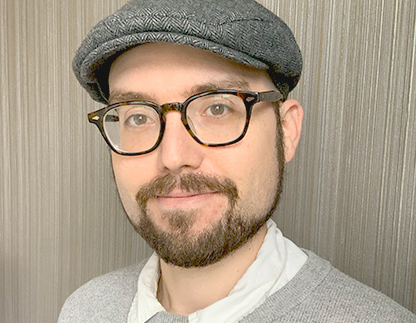Our interdisciplinary PhD program at Northwestern made me realize that what really interested me was cross-cultural exchanges and hidden historical narratives.”
Paul G. Feller-Simmons
PhD Candidate in the Department of Musicology

Paul Feller-Simmons is a PhD candidate in the Musicology Program in the Bienen School of Music. Primarily an early modernist, Paul's work engages with interdisciplinary approaches to Jewish-Christian musical exchanges, music in the Spanish colonies, and musical othering. His dissertation investigates how musical experiences mobilized culture between Jewish and Christian communities and social and territorial borders in seventeenth- and eighteenth-century Northwestern Europe. Paul is a Presidential Fellow, which is the most prestigious fellowship awarded to graduate students by Northwestern University.
How would you describe your research and/or work to a non-academic audience?
I understand music in a broad way, which indeed includes performance and listening, but also paying musicians and even talking about music. In that sense, I am interested in how musical and musical-adjacent practices served as an everyday means of interaction between Jewish and Christian communities. For instance, my dissertation discusses how Sephardic cantors from Amsterdam turned to Italianate opera to express their communal self-narratives as cosmopolitan and of elevated social status throughout the 1700s. Other cases in my dissertation include traveling Jewish musicians who visited the German trade fairs to perform before thousands of people from all corners of Europe, and Jewish families who hired Christian musicians for their weddings, among others.
What have been some of the most memorable twists and turns of your career?
I would say that the most memorable twist of my career was to completely change my research focus. Up until the end of my first year at Northwestern, I was determined to study musical practices developed within the areas of Spanish influence in the early modern world, especially in the American colonies. Yet, our interdisciplinary PhD program at Northwestern made me realize that what really interested me was cross-cultural exchanges and hidden historical narratives. Nonetheless, I had to learn how to navigate an entirely new research field.
Tell us what inspired your research and/or work.
I would say that my personal identity and family history inspired my interest in Jewish history in the German-speaking lands. Getting to know different aspects of Jewish-Christian historical relations thanks to the guidance of Northwestern faculty members was, of course, a fundamental source of inspiration for my current work.
What do you find both rewarding and challenging about your research and/or work?
I find it highly enjoyable to piece a historical puzzle together and the history of Jewish culture has shown to be a challenging one. When working on minority and marginal communities from the past, especially when it comes to ephemeral performance practices such as music, we work with very little, often merely implied information. The task is challenging. Just to decipher the relevant historical documents, for example, you need to know several languages usually written using archaic spellings and vocabulary and different historical scripts. Reading the documents, however, is just the first of several steps required to put together a cogent narrative. To me, constructing such a narrative is highly rewarding.
Why Northwestern?
No commitment that will define the next five or six years of your life is an easy choice. Choosing Northwestern University was indeed not easy, but also the best choice I could have made. Not only is Northwestern’s Musicology Program among the best in the world but also one of the very few that can boast of having more than two world-renowned faculty members dedicated to the early-modern world.
When I was applying to PhD programs, my focus was on music throughout the Spanish-American colonies, and we have an authority in the subject at Northwestern. Moreover, I already had family in Chicago, which turned out to be an essential element of social support when moving to the U.S. from abroad. At Northwestern, there is also incredible institutional support for interdisciplinary research, which is something I always found important.
What books are on your bedside table?
I always find myself returning to Isaac Asimov and J. R. R. Tolkien. I am currently reading the German translation of The Hobbit for the second time.
What did you originally want to be when you grew up?
Before I became interested in music, up until ninth grade, I was absolutely sure I was going to become a lawyer. It was a natural career choice, following the path of my father and grandfather.
Tell us about a current achievement or something you're working on that excites you.
Among other things, I am excited about some of the outreach initiatives I have been developing. I am currently preparing several different pre-concert lectures, including collaborations with Chicago's Newberry Consort. For these concerts, the performances will include pieces I have edited and that have not been played in hundreds of years; I am excited to hear that music come alive.
Publish Date: October 24, 2023
If you know a graduate student, postdoctoral trainee, graduate faculty member, staff member, or a member of our TGS alumni population who would make a great candidate for our TGS Spotlight Series, please complete this brief TGS Spotlight Series Nomination Form.